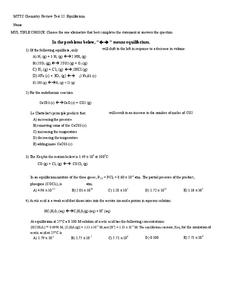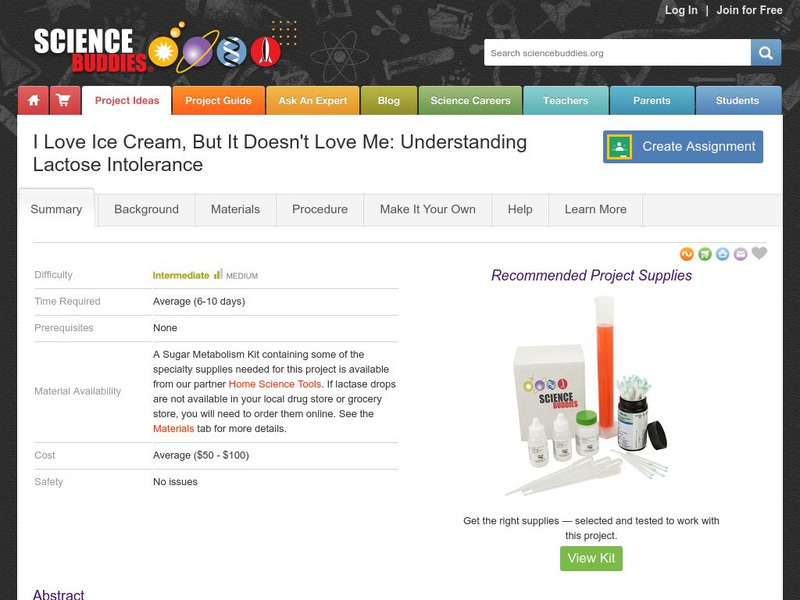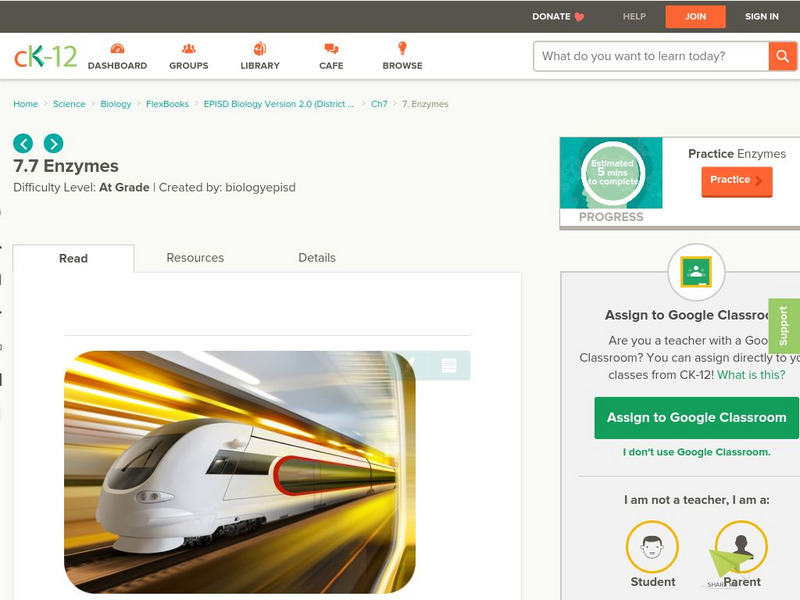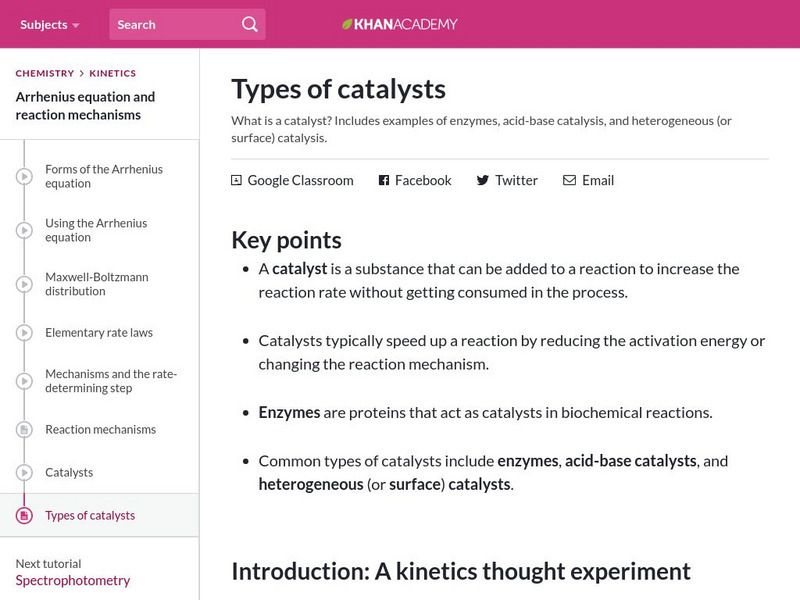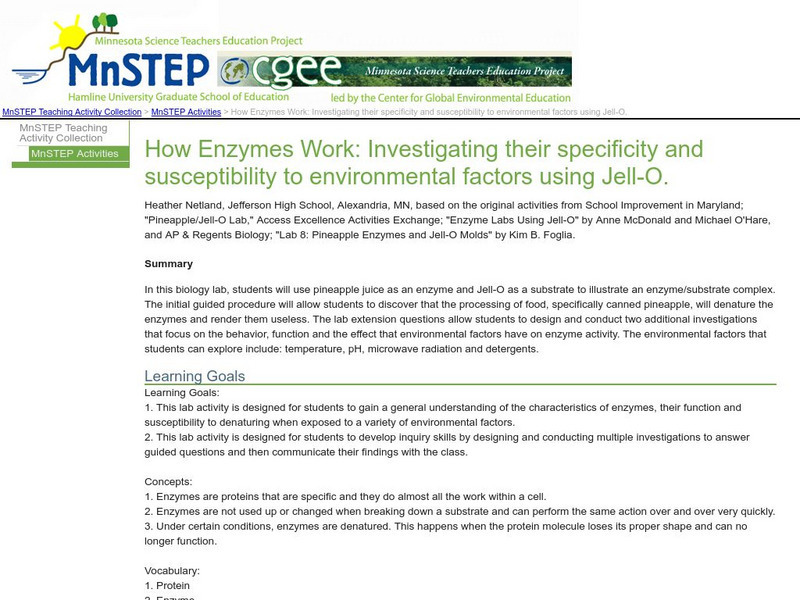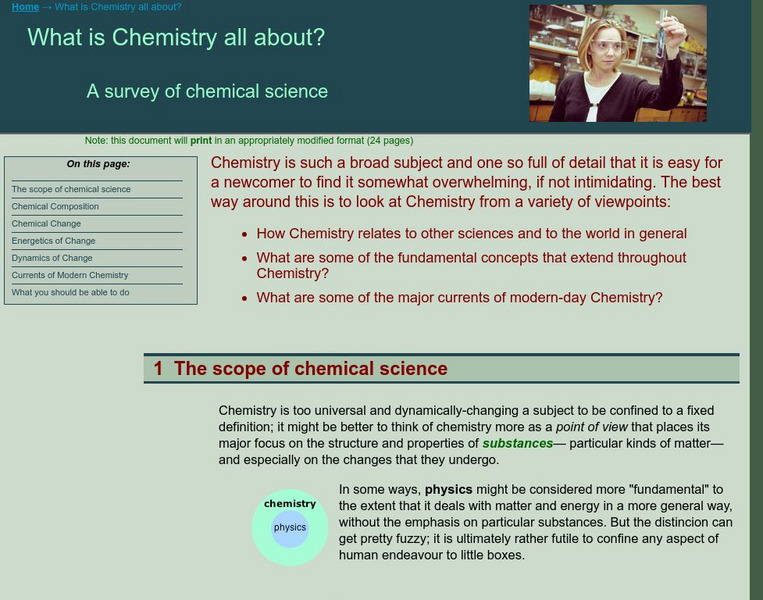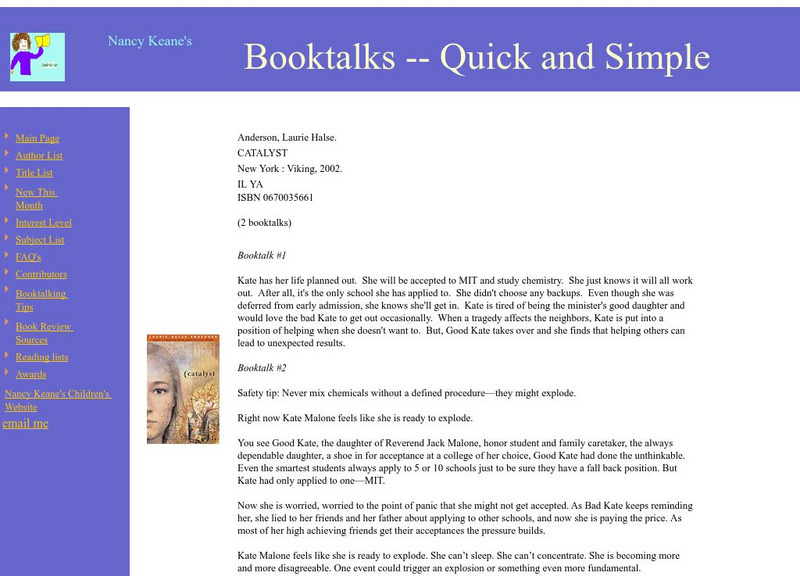Curated OER
Le Chatelier's Principle
In this chemical reactions activity, students apply the Le Chatelier's principle to determine the equilibrium shift in the reaction based on specific changes to the system. This activity has 2 short answer questions and 2 problems to solve.
Curated OER
Le Chatelier's Principle
In this chemical reaction learning exercise, students apply Le Chatelier's Principle to explain how the given changes in reaction conditions will affect the position of equilibrium. This learning exercise has 6 problems to solve.
Curated OER
Reaction Mechanisms
In this reactions worksheet, students give the equation for the overall reaction, identifying the catalyst in the equation. Students create graphs and write out the rate determining step. This worksheet has 4 graphs, 2 short answers, and...
Curated OER
Equilibrium
For this equilibrium worksheet, students predict the concentrations of solutions at equilibrium and apply Le Chatelier's principle to systems at equilibrium. This worksheet has 15 multiple choice questions.
Curated OER
Equilibrium Problems
In this equilibrium worksheet, students determine what effect a catalyst has on the rate of a reaction and the activation energy. Students explore how the equilibrium shifts when different stresses are added to a compound. This worksheet...
Curated OER
Chemistry
In this chemistry worksheet, students describe an atom, its parts, the charges of these parts, and atoms life functions. Then they explain what the octet rule states for the placements of electrons around the nucleus of an atom. Students...
Curated OER
Activity #6 How Fast Do Reactions Go?
Students name the factors (concentration, temperature, and a catalyst) which can affect the rate of a chemical reaction. They use their knowledge of particle theory to explain their observations. Pupils comprehend that the...
Curated OER
Activity #19 Oxygen For Yeast
Students observe and record what occurs when yeast is added to hydrogen peroxide. They indicate why a chemical reaction (decompostion) must have occurred during the experiement. Pupils explain why yeast was used. Students comprehend the...
American Chemical Society
Middle School Chemistry: Lesson Plans: A Catalyst and the Rate of Reaction
Young scholars observe and investigate how a catalyst increases the rate of a chemical reaction while not becoming part of the products of the reaction.
TED Talks
Ted: Ted Ed: Activation Energy Kickstarting Chemical Reactions
Chemical reactions are constantly happening in your body - even at this very moment. But what catalyzes these important reactions? Vance Kite explains how enzymes assist the process, while providing a light-hearted way to remember how...
Science Buddies
Science Buddies: I Love Ice Cream, but It Doesn't Love Me: Lactose Intolerance
Pizza, milk shakes, and ice cream sundaes all contain dairy products, therefore they cannot be eaten by the majority of people around the world. Dairy products contain the sugar molecule lactose, and the majority of people on the planet...
Encyclopedia of Earth
Encyclopedia of Earth: Physics & Chemistry: Catalysis
Gives definition of catalysis, an explanation of how it works, different kinds of catalysis and examples, substances that impact on the catalytic process, the many applications of catalysis, and a history of catalyst technology.
American Chemical Society
Middle School Chemistry: Chapter 6: Chemical Change
Twelve interactive chemistry lessons about chemical changes complete with handouts and animations.
CK-12 Foundation
Ck 12: Enzymes
[Free Registration/Login may be required to access all resource tools.] In this lesson, students will define enzyme, be able to discuss the role of enzymes in biochemical reactions, and summarize their importance to living organisms.
Georgia Department of Education
Ga Virtual Learning: Ap Chemistry: Kinetics and Equilibrium
Through interactive activities in a module format, students learn about kinetics, collision theory, reaction rates, and rate laws. They will calculate rate laws from experimental data, concentration and time, and half-life of a reaction....
Khan Academy
Khan Academy: Types of Catalysts
What is a catalyst? This Khan Academy resource includes examples of enzymes, acid-base catalysis, and heterogeneous (or surface) catalysis.
American Chemical Society
American Chemical Society: Hompage
ChemCenter, available from the American Chemical Society, provides chemistry news, reference sources and other public services.
Other
The Organometallic Hyper Text Book: Olefin Metathesis
Rearrangements of alkene with transition metal complexes. Includes information on catalysts, mechanisms and other similar polymerizations.
OpenStax
Open Stax: Chemical Reactions
This site provides an overview of the role of energy in chemical reactions.
Concord Consortium
Concord Consortium: Stem Resources: Catalysts
Want to see how a catalysts help a reaction happen? In this science simulation, students can experience a reaction that has gone forward due to a catalyst.
Science Education Resource Center at Carleton College
Serc: How Enzymes Work
In this biology lab, students use pineapple juice as an enzyme, and jello as a substrate to illustrate an enzyme/substrate complex.
Simon Fraser University
Chem1 Virtual Textbook: Dynamics of Chemical Change
Dynamics of chemical change is a section of a larger overview on Chemistry, which covers a variety of aspects. This particular section focuses on kinetics and mechanism, kinetics, and catalysts. Examples, formulas, and pictures are...
Polk Brothers Foundation Center for Urban Education at DePaul University
De Paul University: Center for Urban Education: A Garden in Lawndale [Pdf]
"A Garden in Lawndale" is a one page, non-fiction, reading passage about an eighth grade class who planted a garden in a vacant lot by their school and maintained it to improve their neighborhood. It is followed by constructed-response...
Nancy J. Keane
Booktalks: Catalyst by Laurie Halse Anderson
Two booktalks are offered here to spark interest in Anderson's book.





